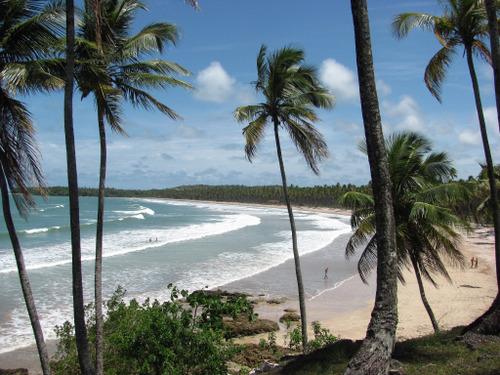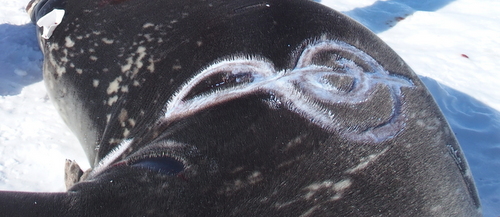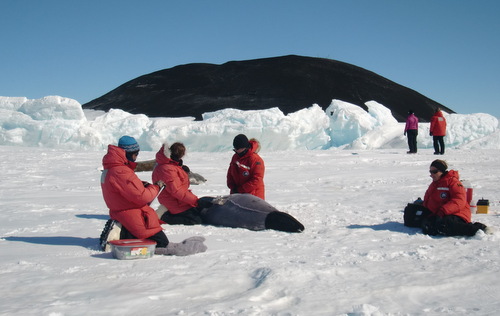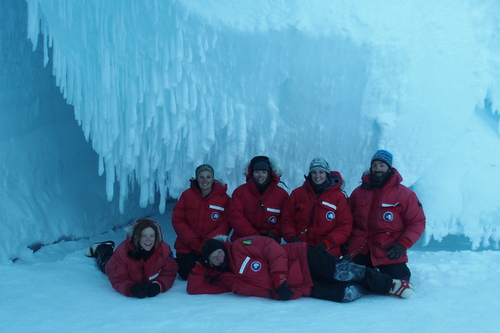Field work update
We last left you with 12 seals worked this field season. I’m happy to announce that we have completed all 24 seals. Here’s how the breakdown looks. We worked:
- 8 early moms
- 8 skip females
- 8 late moms
If you missed a summary of the first ½ of the season, you can catch up here
For an introduction to the study, click here
 Seal colony. Photo credit: Alex Eilers.
Seal colony. Photo credit: Alex Eilers.
Field day 9, November 27
Field day 9 took us back to our first successful location, Turks Head, where we worked with WS14-13. I got to name this seal. Since my lucky number is 13, we decided to name this seal ‘Lucky.’ She was an early mom and weighed 302 kg.
WS14-14 was also worked at this location. We named her ‘Lole’ after a suggestion from some students in Alaska. Apparently, Lole is the Samoan word for candy. Lole was a skip female and weighed considerably more than the mom we had just worked. She weighed 466 kg.
Field day 10, November 28
Field day 10 again took us back to our most successful location, Hutton Cliffs. We worked our last two skip females of the season (WS14-15 and WS14-16). They were ‘healthy’ females, both tipping the scales above 400 kg.
WS14-15, who we called Buttercup, weighed 413 kg.
WS14-16, who we called ‘Skua,’ after the pesky Antarctic bird, weighed 435 kg.
 Can you see the Skua print? Photo credit: Greg Frankfurter. MMPA number 17411.
Can you see the Skua print? Photo credit: Greg Frankfurter. MMPA number 17411.
Can you believe it? We are now 2/3 of the way done, Hurray!
Short Break
Our team is very efficient! It also doesn’t hurt that we’ve had a run of good luck and ‘good’ weather. We have now completed all of our ‘early moms' and our ‘skip’ females, so we have a few days back at the lab to restock, replenish and relax before the ‘late’ moms are ready.
 We wish... Photo credit: mostli, flicker.com
We wish... Photo credit: mostli, flicker.com
Field day 11, December 5
Rested and rejuvenated, the team is ready for Field day 11, and to be honest, I think we were all ready to get back on the ice.
Several ‘late’ moms were spotted earlier at Hutton Cliffs, so we made that our first stop. Again, we were in luck. WS14-17 and WS14-18 were found and worked that day.
WS14-17 weighed 301 kg and was named Scooter.
WS14-18 weighed 304 kg and was named Jewels.
Field day 12, December 6
We’re back at Hutton Cliffs, again, where we ‘technically’ worked two more seals. However, the first seal was ‘called off.’ That means, the team vet had a few concerns about the animal. It was nothing major, but since the well-being of the animal is our first priority, we cut our handling short.
This was seal WS14-19 and we did not get a weight or name for her.
Seal 20, however, was a different story altogether. She was an excellent seal to work with. WS14-20 was called ‘Treble’ because her dye mark was in the shape of a treble clef. Our team is always singing songs, so we thought it was appropriate.
 Treble, named after our singing crew. Photo credit: Greg Frankfurter. MMPA number 17411.
Treble, named after our singing crew. Photo credit: Greg Frankfurter. MMPA number 17411.
Treble weighed 316 kg.
It’s hard to believe, we just got back on the ice and only had 4 more seals to go.
Field day 13, December 9
We are on a roll! Another two seal day at Hutton Cliffs.
And we must have been in a singing mood, as one of the team members started singing the song ‘Lucy in the sky with diamonds’ after we gave this seal a diamond-shaped dye mark. WS14-21, Lucy weighed 262 kg.
WS14-22 was named ‘P.P.’ and had musical notes on her back. But that had nothing to do with how she got her name.
Any ideas why we named this seal P. P.? Think about it a minute.
Sometimes things get a little ‘messy’ in the field, especially when working with live animals. That’s just part of the game. This seal got its name because, just as Dr. Burns was finishing the animal’s blood work, this seal decided to, shall we say, ‘relieve herself’ very near Dr. Burns. Oops!
Needless to say, the wind pants Dr. Burns was wearing got a thorough cleaning that night.
P. P. weighed 221 kg.
Field day 14, December 10
With only two more seals to go, there was a possibility we’d finish the field work today, but no such luck. Only one seal today. And you’ll never believe where we found Seal 23. If you guessed Hutton Cliffs, you are correct.
This seal was given its name from students in both Alaska and Illinois. I personally think this is the coolest name for a seal. Both groups of students wanted to name a seal – ‘Sealfie.’ How cute!
So WS14-23 was names ‘Sealfie’ and weighed 300 kg.
 Do you think this seal is taking a selfie? Photo credit: Greg Frankfurter. MMPA number 17411.
Do you think this seal is taking a selfie? Photo credit: Greg Frankfurter. MMPA number 17411.
Field day 15, December 11
Our last seal of the season!!!
Although we went to Hutton Cliffs (the most successful area, in terms of finding seals), we had no luck today. So it was off to Turtle Rock, where we found WS14-24, the last seal of this season! And as an added bonus, she was one of the easiest seals we worked the entire season. Everything went perfectly! What a way to end the season.
Since she was in the backdrop of Turtle Rock, we named her Turtle. She weighed 247 kg.
 Our last seal of the season. Photo credit: Alex Eilers. MMPA number 17411.
Our last seal of the season. Photo credit: Alex Eilers. MMPA number 17411.
Try it!
- Go back and take a look at the weights of all the seals we’ve worked with.
- Chart them and tell me if you notice a difference.
- Send your comments to ‘Ask the Team’ and if there is a difference, hypothesize about why.
Wish us luck
This may be the last journal post as we are scheduled to leave tomorrow – weather permitting, of course.
That said, the team wishes everyone a very Merry Christmas and Happy Holidays!!!
Seal Team Six
 Merry Christmas and Happy Holidays!!! Photo credit: Greg Frankfurter.
Merry Christmas and Happy Holidays!!! Photo credit: Greg Frankfurter.
 And just for fun! Photo credit: Greg Frankfurter.
And just for fun! Photo credit: Greg Frankfurter.

Comments